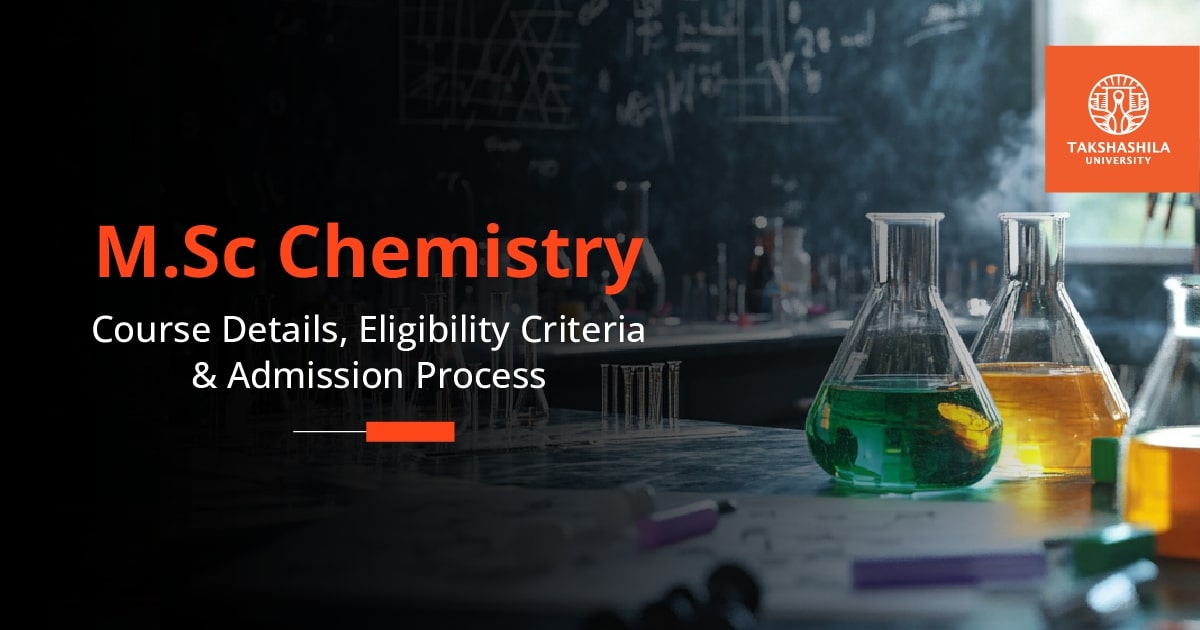M Sc Chemistry Course Details: An Introduction
M.Sc. Chemistry course details offer students an in-depth look at advanced chemistry, preparing them for industries like drug development, environmental protection, and sustainable technology. The UK-based MSc Chemistry program spans one year and focuses on creating new materials, drugs, and technologies. The University of Bass, Texas, provides a specialized program aimed at developing porous materials for carbonising precursors, emphasizing chemistry’s real-world applications. Designed for students passionate about chemistry, the course dives into the study of chemical reactions and their practical use in various fields.
In this article, we explore all aspects of the M.Sc. Chemistry program, including Course Details, Eligibility Criteria, and the Admission Process.
Let’s get started!

Overview of the M Sc Chemistry Course
The M.Sc Chemistry program typically spans two years, divided into four semesters. The course provides a comprehensive understanding of various branches of chemistry, including:
- Chemistry is advancing quickly, and newer aspects are being researched and utilised. Some of the emerging and most beneficial niches in M.Sc Chemistry are:
- Nanochemistry: The research of nanomaterials and their functionality, which has the potential to be utilised in medicine, electronics, and energy storage.
- Medicinal Chemistry: Deals with the invention and creation of pharmaceutical medicines.
- Environmental Chemistry Deals with the control of pollution, sustainable practices for the environment, and waste management.
- Green Chemistry: The design of chemical reactions that eliminate or reduce the use and generation of hazardous substances
- Forensic Chemistry: Applied in criminal investigations to trace substances and purposes they served in committing the crime.
Students studying for an M.Sc in Chemistry could recommend the areas in which they would like to major based on their career aspirations.
Key Concepts in Chemistry
Throughout the M.Sc Chemistry program, students explore various vital concepts such as:
- Molecular structure and bonding theories
- Thermodynamics and kinetics
- Reaction mechanisms and catalysis
- Spectroscopy and chromatography techniques
- Electrochemistry and its applications
- Nanotechnology and materials chemistry
- Green chemistry and sustainable processes
These concepts are fundamental to understanding chemical reaction principles and applicable across various industries, including pharmaceuticals, energy, and environmental protection.
Emerging Fields in M Sc Chemistry
The field of chemistry is evolving rapidly, and new research and application areas are emerging. Some of the most promising regions in M.Sc Chemistry include:
- Nanochemistry: The study of nanomaterials and their properties, which have applications in medicine, electronics, and energy storage.
- Medicinal Chemistry: Involves the design and development of pharmaceutical drugs.
- Environmental Chemistry: Focuses on pollution control, environmental sustainability, and waste management.
- Green Chemistry: The development of chemical processes that are environmentally friendly and sustainable.
- Forensic Chemistry: Used in criminal investigations to identify substances and understand their role in crimes.
Students pursuing an M.Sc in Chemistry can specialise in these areas, depending on their interests and career goals.
Career Opportunities in M.Sc Chemistry
An M.Sc Chemistry degree opens the door to a wide range of career opportunities, including:
Research and Development Roles
- Chemical Researcher: Individuals would be employed in laboratories or other research institutions to identify and synthesise new chemical compounds.
- Pharmaceutical Researcher: Such individuals would be responsible for producing new medicines and chemicals and their impact on the biological system.
- Material Scientist: Design new materials with desired properties to be used in electronics, construction and manufacturing industries.
Industrial Applications
- Chemical Engineer: Engage in industries like petrochemicals, fertilisers or food processing.
- Environmental Consultant: Provide solutions on sustainable development, pollution control, and waste management to organisations.
- Quality Control Analyst: Manage and control the quality of chemical products in food and beverage industries, pharmaceuticals, cosmetics and other industries.
Academia and Teaching
- Professor/Researcher: Teach in colleges or predominantly perform research work in academic or research institutions.
- Laboratory Technician: Teach institutions or research institutions to partake in experimental configurations and analysis.
Other Opportunities
- Regulatory Affairs Specialist: Ensure compliance of chemical products with quality standards set by national law.
- Forensic Chemist: Cooperate with law enforcement to analyse substances recovered from crime scenes.
Eligibility Criteria for M.Sc Chemistry
To be eligible for the M.Sc Chemistry program, candidates must fulfil the following requirements:
Academic Requirements
- Candidates should have obtained a Bachelor’s degree (B.Sc) in Chemistry or a related field from an accredited university.
- It is typically necessary to pass with between 50 and 60 per cent marks at the undergraduate level, although this may rely on the specific institution.
Specialisations
Some universities might have specializations where applicants further their studies in Medicinal Chemistry, Environmental Chemistry, Polymer Chemistry, or other fields, and they may have extra requirements or preferences.
Age Limit
- Usually, there is no age limit for upper admission to the M.Sc Chemistry program.
Admission Process for M.Sc Chemistry
The admission process for M.Sc Chemistry is generally a multi-step procedure that includes the following:
1. Application Form
- Candidates must complete an online or offline application form, providing their educational qualifications and personal details.
2. Entrance Exam
Many universities and institutes conduct some sort of entrance examination to test a candidate’s proficiency in chemistry. Some of the most popular entrance examinations are:
- JAM (Joint Admission Test for M.Sc), where students from different disciplines compete for admission into the same program.
- GATE (Graduate Aptitude Test in Engineering).
- Other universities conduct exams like the DUET, which is the Delhi University Entrance Test or JNU CEE
3. Merit List
- The specific universities will announce the cutoff list of selected candidates based on the entrance exam results and, in some cases, the results from other previous academic activities or curricula.
4. Counseling and Interview
- In some cases, universities may organise a counselling session or conduct an interview as part of the admission process, and such would-be candidates may be selected for admission.
5. Final Admission
- When the selection process is finally completed, the successful candidates will be offered admission. They will be ready to provide the required papers, remit the fees, and fulfil the other requirements.
Curriculum and Course Structure
An M.Sc Chemistry program’s curriculum aims to achieve theoretical understanding and a practice-based approach toward the course material. The course is arranged into four semesters:
First Year
- Semester 1 covers Organic Chemistry, Inorganic Chemistry, Physical Chemistry and Analytical Chemistry.
- Semester 2: Deals with advanced studies in Stereochemistry, Spectroscopy, Chemical Thermodynamics, reaction mechanisms, and Electrochemistry.
Second Year
- Semester 3: It commences with specialisation courses, such as Environmental Chemistry, Chemistry of Polymers, Biochemistry, and Nanotechnology.
- Semester 4: Involves submission of dissertation or project work and research work so that the student gets practical exposure to the field.
Top Institutions for M.Sc Chemistry
Some of the top institutions in India and abroad offering M.Sc Chemistry are:
- Indian Institutes of Technology (IITs)
- University of Delhi (DU)
- Banaras Hindu University (BHU)
- Jamia Millia Islamia (JMI)
- University of Mumbai
- University of Cambridge (UK)
- Massachusetts Institute of Technology (MIT)
- California Institute of Technology (Caltech)
Scope and Future of M.Sc Chemistry Graduates
M.Sc Chemistry graduates are in high demand across various industries, from pharmaceuticals to environmental science. The growing focus on sustainability, environmental protection, and technological advancement creates an ongoing need for skilled professionals. Graduates can pursue careers in:
- Pharmaceutical and Biotechnology industries
- Ecological research and waste management
- Chemical engineering and material science
- Academia and research institutions
There is also significant potential for further study, including pursuing a PhD or postdoctoral research in specialised areas.
Laboratory and Practical Training
Laboratory work is an integral part of the M.Sc Chemistry program. Students gain hands-on experience in:
- Synthesis of compounds
- Purification techniques
- Chemical analysis
- Instrumental techniques (such as NMR, IR, and UV spectroscopy)
These practical skills are essential for working in the pharmaceuticals, agriculture, and forensic science industries.
Benefits of Studying M.Sc Chemistry
- Acquired Knowledge: Chemistry is studied profoundly, and practical, real-life application is emphasised.
- Employment Options: Numerous employment opportunities exist in research, industry, educational and government settings.
- Research-Based: Participating in innovative research works in different branches is possible.
- Work Options Abroad: M.Sc holders are able to work in different scientific fields internationally due to the appreciation for chemists worldwide.
Challenges Faced by M.Sc Chemistry Students
- Difficult Topics: This course has intricate theoretical and practical components, especially spectroscopy, quantum chemistry, and reaction mechanisms.
- Long and Boring Lab Work: Lab work is often lengthy and strenuous.
- High Competition: M.Sc Chemistry is a popular course, and sufficient students compete for admission to the top universities and institutions.
Postgraduate and Research Opportunities
An M.Sc in Chemistry has provided chiefly a path to scholars and researchers further. Graduates may elect to pursue:
- Ph.D. degrees in specialisations like Organic Chemistry, Inorganic Chemistry, Environmental Chemistry, or Pharmaceutical Chemistry.
- Research jobs in many government and private research organisations like ISRO, BHEL, CSIR, DRDO, etc.
Conclusion
An M.Sc. Chemistry degree widens the scope of career prospects in research, industry, academia, and more. Chemists are in growing demand due to the increasing concern for chemical sciences and their applications in pharmaceuticals, environmental conservation, and material science.
It is beneficial for students to choose to do M.Sc Chemistry as they are well educated in the chemistry field and equipped with the necessary practical and research-oriented skills in a challenging and fulfilling profession.
Want to know more about M.Sc Chemistry? Feel free to contact our mentor today at Takshahila Engineering College!
FAQ
1. How long does it take to complete the M.Sc Chemistry course?
The M.Sc Chemistry course usually lasts two years or over four semesters.
2. What are the eligibility criteria for M.Sc Chemistry?
Candidates must pass the B.Sc degree in Chemistry or a related stream from a recognised university, scoring at least 50% to 60% marks (depending on the institution). Further, some institutions may expect candidates to clear an entrance test.
3. Is there an upper age bar for admission to the M.Sc Chemistry course?
There is usually no age restriction for pursuing an M.Sc in chemistry. However, candidates must have obtained their undergraduate degree before admission.
4. Can I specialise in a particular field during M.Sc Chemistry?
Yes, depending on the university and course structure, M.Sc Chemistry students can specialise in areas such as Medicinal Chemistry, Environmental Chemistry, Polymer Chemistry, Analytical Chemistry, and Nanotechnology.






